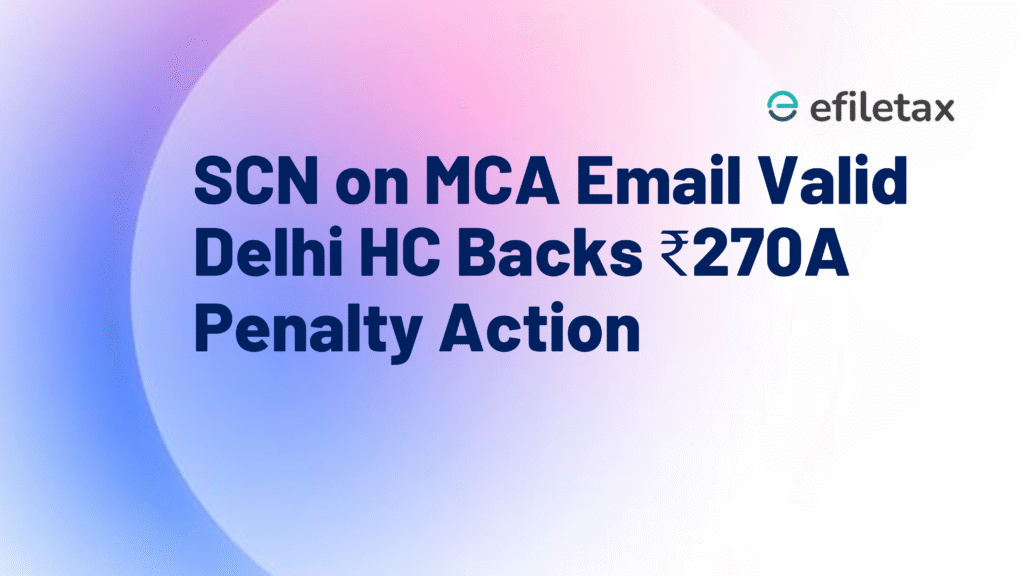
Summary
The Delhi High Court ruled that a penalty notice under Section 270A of the Income Tax Act is valid if sent to the email ID listed on the MCA portal. Even if the taxpayer claims non-receipt, failure to update contact details doesn’t invalidate proceedings.
Introduction
SCN on MCA email is now judicially confirmed as valid for income tax communication. In a recent judgment, the Delhi High Court upheld the penalty proceedings initiated under Section 270A of the Income Tax Act, 1961, even when the assessee claimed that they never received the notice. This ruling is crucial for Indian businesses and professionals who rely on the MCA portal for statutory compliance.
What Is Section 270A?
Section 270A deals with penalty for under-reporting and misreporting of income. It empowers the Assessing Officer to impose a penalty ranging from:
- 50% of tax payable on under-reported income
- 200% in cases of misreporting
The penalty applies regardless of intent and is procedural in nature.
The Delhi HC Case: Key Facts
| Detail | Case Information |
|---|---|
| Court | Delhi High Court |
| Petitioner | M/s The Bullmen Realty India Pvt. Ltd. |
| Notice Sent On | Email ID registered on the MCA portal |
| Petitioner’s Claim | Didn’t receive the SCN; email not used for tax matters |
| Outcome | Court upheld penalty; email validity confirmed |
Key Legal Takeaways
- Email on MCA = Valid Communication
Section 2(23C) and Section 282 of the IT Act support service via electronic means, especially when the email is sourced from an official government database like MCA. - Non-receipt Argument Rejected
If a company fails to update its email or monitor the MCA-registered ID, the onus is not on the Income Tax Department. - Procedural Fairness Upheld
The Court ruled that adequate opportunity was given via e-communication and hence penalty under Section 270A was legally sustainable.
Expert View: Compliance Tip
“Update your email ID and mobile on all statutory platforms — MCA, GST, and Income Tax. In today’s digital-first enforcement, claiming ignorance of a notice due to outdated contact details won’t hold up in court.”
— Tax Consultant, Efiletax Advisory Panel
Practical Implications for Businesses
- Cross-link emails across platforms: Ensure MCA, GST, and IT portal emails are aligned.
- Check MCA portal regularly: Directors often miss notices because these emails are rarely monitored.
- Assign a compliance officer: Especially in private companies where the promoter handles all filing.
- Document email changes: Keep records when you update details across platforms.
Legal Reference
- Section 270A – Penalty for under-reporting/misreporting of income
- Section 282 – Modes of service of notice
- Companies Act, 2013 – Email ID on MCA portal is part of public and legal record
- Delhi High Court Judgment – [WP(C) 10626/2023, decided on 27.05.2024]
FAQs
Q1. Is it mandatory to update email ID on the MCA portal?
Yes. It forms the official communication line for both MCA and allied regulatory notices.
Q2. Can I challenge a penalty if I didn’t receive the SCN personally?
No. As per the latest HC ruling, notice sent to MCA-registered email is considered valid service.
Q3. What if my company has shut down that email?
You’re still responsible. Failure to monitor or update does not invalidate notice under law.
Conclusion
The Delhi HC verdict reinforces the digital accountability framework for Indian businesses. Ignoring your MCA-registered email could now lead to legally enforceable tax penalties. Stay proactive, stay compliant — and let Efiletax help you track notices and manage statutory updates without hassle.